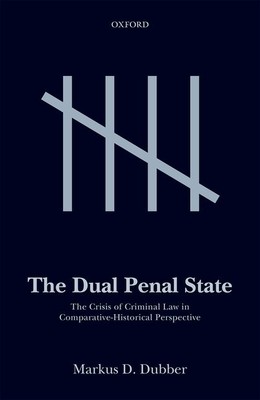
- We will send in 10–14 business days.
- Author: Markus D Dubber
- Publisher: Oxford University Press, USA
- ISBN-10: 0198744293
- ISBN-13: 9780198744290
- Format: 15.5 x 23.6 x 2.5 cm, hardcover
- Language: English
- SAVE -10% with code: EXTRA
Reviews
Description
In The Dual Penal State, Markus Dubber addresses the rampant use of penal power in Western liberal democracies. The interference with the autonomy of the very persons upon whose autonomy the legitimacy of state power is supposed to rest is systemically normalized, rather than continuously scrutinized. The fundamental challenge of the penal paradox-the prima facie illegitimacy of modern punishment-remains unaddressed and unresolved.
Focusing on the United States and Germany, and drawing on his influential account of the patriarchal origins of police power, Dubber exposes the persistence of a two-sided criminal justice regime: the dual penal state. The dual penal state combines principled punishment of equals under the rule of law, on one side, with punitive discipline of others under the rule of police, on the other. Slavery has long played a central role in drawing the line between the two sides of the dual penal state. In Europe, the slave appears in the classic and still foundational accounts of liberal punishment (from Beccaria to Kant) as the paradigmatic other beyond the protection of law, not a legal subject but a mere object of the master's or the state's discretionary discipline. In America, the patriarchal power to police portrays the continuum from the antebellum slaveholder's whipping of his slaves in private and the racial terror perpetrated by slave patrols in public, to the apartheid regime of Jim Crow and the treatment of prisoners as "slaves of the state," and eventually to the late 20th century's systemic racial violence of the "war on crime" and the widespread killing of Black suspects by an increasingly militarized and armed police force that triggered the global Black Lives Matter movement.EXTRA 10 % discount with code: EXTRA
The promotion ends in 16d.20:00:08
The discount code is valid when purchasing from 10 €. Discounts do not stack.
- Author: Markus D Dubber
- Publisher: Oxford University Press, USA
- ISBN-10: 0198744293
- ISBN-13: 9780198744290
- Format: 15.5 x 23.6 x 2.5 cm, hardcover
- Language: English English
In The Dual Penal State, Markus Dubber addresses the rampant use of penal power in Western liberal democracies. The interference with the autonomy of the very persons upon whose autonomy the legitimacy of state power is supposed to rest is systemically normalized, rather than continuously scrutinized. The fundamental challenge of the penal paradox-the prima facie illegitimacy of modern punishment-remains unaddressed and unresolved.
Focusing on the United States and Germany, and drawing on his influential account of the patriarchal origins of police power, Dubber exposes the persistence of a two-sided criminal justice regime: the dual penal state. The dual penal state combines principled punishment of equals under the rule of law, on one side, with punitive discipline of others under the rule of police, on the other. Slavery has long played a central role in drawing the line between the two sides of the dual penal state. In Europe, the slave appears in the classic and still foundational accounts of liberal punishment (from Beccaria to Kant) as the paradigmatic other beyond the protection of law, not a legal subject but a mere object of the master's or the state's discretionary discipline. In America, the patriarchal power to police portrays the continuum from the antebellum slaveholder's whipping of his slaves in private and the racial terror perpetrated by slave patrols in public, to the apartheid regime of Jim Crow and the treatment of prisoners as "slaves of the state," and eventually to the late 20th century's systemic racial violence of the "war on crime" and the widespread killing of Black suspects by an increasingly militarized and armed police force that triggered the global Black Lives Matter movement.

Reviews